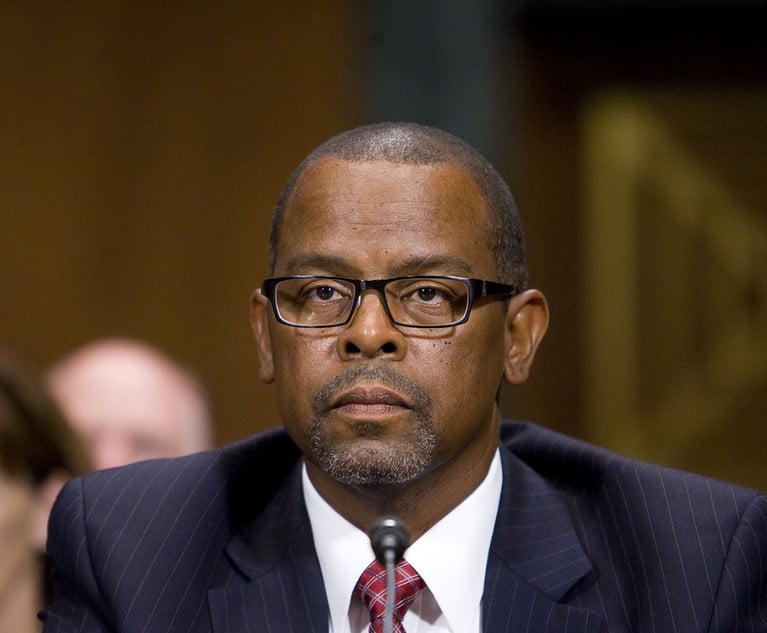 Connecticut Supreme Court in Hartford. Courtesy Photo
Connecticut Supreme Court in Hartford. Courtesy PhotoConnecticut Supreme Court Clarifies Sovereign Immunity in Case Involving Multiple Public Agencies
The state Supreme Court has tightened the rules regarding sovereign immunity and those that could sue transportation commissioner James Redeker for injuries sustained on state bridges.
November 26, 2018 at 03:49 PM
3 minute read
By a narrow 4-3 ruling, the Connecticut Supreme Court has clarified a law related to the sovereign immunity of the state when dealing with highway-related injuries.
On Nov. 20, the state's high court reversed in part and affirmed in part the judgment of the Connecticut Appellate Court, which had granted summary judgment in favor of the Commissioner of Transportation in a case brought by motorist Barry Graham. It found that Graham's personal injury action was barred by sovereign immunity under the state's Highway Defect Statute.
Graham, who was seriously injured on Interstate 95 when his pickup truck slid on black ice and crashed into a structure on a state bridge in 2011, had sued the state Department of Transportation.
But the state Supreme Court held that Commissioner James Redeker couldn't be held liable for the state police's failure to close the bridge.
In its 21-page ruling, the high court said there was no evidence the requisite relationship existed between the commissioner and the state police, and therefore the commissioner and the Department of Transportation aren't liable.
“We disagree with the plaintiff's argument that the waiver of sovereign immunity under Connecticut General Statutes 13a-144 extends to the actions of any state employee without regard to that employee's relationship to the commissioner,” Chief Justice Richard Robinson wrote. “Extending 13a-144 to include the negligence of any state employee, not otherwise engaged in highway maintenance … constitutes an expansion of potential liability on the state that is not within the clear reach of the statute.”
Robinson wrote that the “floodgates would open, and the commissioner could well be held liable for the actions of any state employee regardless of his or her affiliation with the department” if the statutes were to take away sovereign immunity for the commissioner with regard to any state employee that the commissioner oversees. “That would be far too broad,” Robinson wrote.
Graham's lawsuit, though, alleging negligence by the DOT, is not affected by the state high court's ruling and is still pending.
In the dissent, Justice Gregory D'Auria wrote: “Although the majority indicates it is reaching only the first certified question—sovereign immunity—and not the second certified question—duty—I believe it has mixed the concepts of sovereign immunity and duty.”
D'Auria continued: “I believe blending these distinct doctrines will thwart injured parties seeking to vindicate statutory rights in a way the Legislature did not intend.”
Graham was represented by Ralph Monaco and Eric Garofano, both with the New London-based Conway, Londregan, Sheehan & Monaco. Neither Monaco nor Garofano responded to a request for comment.
The Commissioner of Transportation was represented by Lorinda Coon, of Hartford's Cooney, Scully & Dowling. Coon did not respond to a request for comment.
Judd Everhart, director of communications for the state Department of Transportation, did not respond to a request for comment Monday.
This content has been archived. It is available through our partners, LexisNexis® and Bloomberg Law.
To view this content, please continue to their sites.
Not a Lexis Subscriber?
Subscribe Now
Not a Bloomberg Law Subscriber?
Subscribe Now
NOT FOR REPRINT
© 2024 ALM Global, LLC, All Rights Reserved. Request academic re-use from www.copyright.com. All other uses, submit a request to [email protected]. For more information visit Asset & Logo Licensing.
You Might Like
View All
Art of the Settlement: Trump Attorney Reveals Strategy in ABC Lawsuit

‘Really Deflating’: Judges React to Biden Threat to Veto New Judgeships Bill

Decisions Have 'Real-Life Consequences': Juvenile Court Judge Considered for Appellate Bench

'Don't Be Afraid to Dumb It Down': Top Fed Magistrate Judge Gives Tips on Explaining Complex Discovery Disputes
Trending Stories
Who Got The Work
Michael G. Bongiorno, Andrew Scott Dulberg and Elizabeth E. Driscoll from Wilmer Cutler Pickering Hale and Dorr have stepped in to represent Symbotic Inc., an A.I.-enabled technology platform that focuses on increasing supply chain efficiency, and other defendants in a pending shareholder derivative lawsuit. The case, filed Oct. 2 in Massachusetts District Court by the Brown Law Firm on behalf of Stephen Austen, accuses certain officers and directors of misleading investors in regard to Symbotic's potential for margin growth by failing to disclose that the company was not equipped to timely deploy its systems or manage expenses through project delays. The case, assigned to U.S. District Judge Nathaniel M. Gorton, is 1:24-cv-12522, Austen v. Cohen et al.
Who Got The Work
Edmund Polubinski and Marie Killmond of Davis Polk & Wardwell have entered appearances for data platform software development company MongoDB and other defendants in a pending shareholder derivative lawsuit. The action, filed Oct. 7 in New York Southern District Court by the Brown Law Firm, accuses the company's directors and/or officers of falsely expressing confidence in the company’s restructuring of its sales incentive plan and downplaying the severity of decreases in its upfront commitments. The case is 1:24-cv-07594, Roy v. Ittycheria et al.
Who Got The Work
Amy O. Bruchs and Kurt F. Ellison of Michael Best & Friedrich have entered appearances for Epic Systems Corp. in a pending employment discrimination lawsuit. The suit was filed Sept. 7 in Wisconsin Western District Court by Levine Eisberner LLC and Siri & Glimstad on behalf of a project manager who claims that he was wrongfully terminated after applying for a religious exemption to the defendant's COVID-19 vaccine mandate. The case, assigned to U.S. Magistrate Judge Anita Marie Boor, is 3:24-cv-00630, Secker, Nathan v. Epic Systems Corporation.
Who Got The Work
David X. Sullivan, Thomas J. Finn and Gregory A. Hall from McCarter & English have entered appearances for Sunrun Installation Services in a pending civil rights lawsuit. The complaint was filed Sept. 4 in Connecticut District Court by attorney Robert M. Berke on behalf of former employee George Edward Steins, who was arrested and charged with employing an unregistered home improvement salesperson. The complaint alleges that had Sunrun informed the Connecticut Department of Consumer Protection that the plaintiff's employment had ended in 2017 and that he no longer held Sunrun's home improvement contractor license, he would not have been hit with charges, which were dismissed in May 2024. The case, assigned to U.S. District Judge Jeffrey A. Meyer, is 3:24-cv-01423, Steins v. Sunrun, Inc. et al.
Who Got The Work
Greenberg Traurig shareholder Joshua L. Raskin has entered an appearance for boohoo.com UK Ltd. in a pending patent infringement lawsuit. The suit, filed Sept. 3 in Texas Eastern District Court by Rozier Hardt McDonough on behalf of Alto Dynamics, asserts five patents related to an online shopping platform. The case, assigned to U.S. District Judge Rodney Gilstrap, is 2:24-cv-00719, Alto Dynamics, LLC v. boohoo.com UK Limited.
Featured Firms
Law Offices of Gary Martin Hays & Associates, P.C.
(470) 294-1674
Law Offices of Mark E. Salomone
(857) 444-6468
Smith & Hassler
(713) 739-1250










